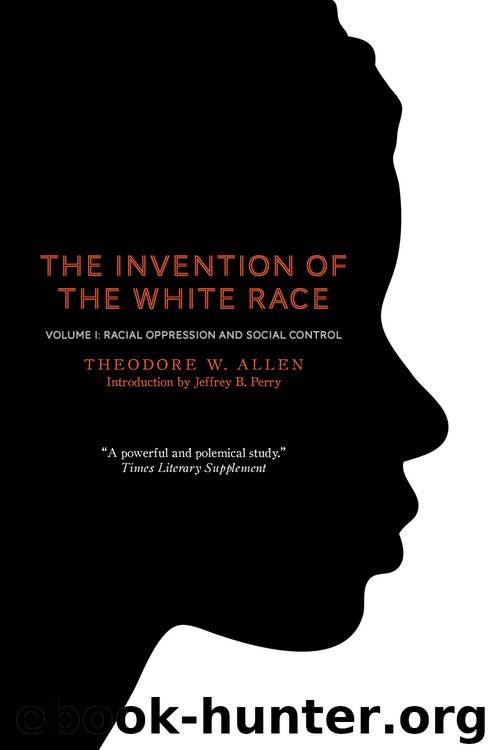The Invention of the White Race, Volume 1 by Theodore W. Allen

Author:Theodore W. Allen [Allen, Theodore W.]
Language: eng
Format: epub
ISBN: 978-1-84467-843-3
Publisher: Verso Books
Published: 2014-06-03T04:00:00+00:00
Labor competitions given an abnormal “racial” form
Prior to 1840, a wide range of industrial employments (from longshoring to coachman), service occupations (from stableman to table-waiting), as well as domestic service in New York were “almost wholly in the hands of African-Americans. Their wages were good relative to those of other workers. The Irish, driven into exile by famine, competed for those jobs by taking lower wages, and by the early 1850s they had made extensive inroads into those fields of employment.110 To assume that it was in the nature of the case that Irish would seek to drive Negroes out, off the job, and do so on the basis of an Irish claim to a “white” identity, is to assume the Jordan–Degler assumption, that “white over black” is a memory of the blood. But that is precisely the notion that the Irish Address denied, denounced and refuted. The Leanders of Ireland remembered what racial oppression meant: the Penal Laws which reduced them to aliens in their own country, the assaults on their families, the denial of education and apprenticeships, the daily humiliations at the hands of Protestants, however lowly in the social scale. If they appealed to their countrymen and countrywomen in America to be brethren to the Negro, and to enter the struggle for abolition, it was not out of ignorance of “race” as a social motive. To the extent that Irish-Americans rejected that appeal and opted instead to stand by the slaveholders on the grounds of fear of job competition from African-Americans, the cause was not actual “job competition.” Rather, the problem of job competition was cast in the mold of white supremacy as an integral part of the social control system instituted by the American slaveholders in the days of William of Orange and Queen Anne and the opening of the Penal Laws era in Ireland.
Although there was widespread discrimination in public services against African-Americans, private employers in the ante-bellum North tended, by contrast, to act as straightforward buyers of labor-power, indifferent to “racial” considerations. It was only after the Civil War that the Northern employers adopted as their own the general principle of racial discrimination in industrial employment.111 Nevertheless, there were powerful countervailing influences: constitutional guarantees, the “white” manhood suffrage laws, and the pervasive power of the Democratic spoils system, which served to encourage the extensions of the principle of “racial” preference in employment to the North. Special mention is due to the Custom House as a bell-wether in the effort to establish the principle of “racial” preference in hiring in the North.
Control of hiring at the United States Custom House was in the hands of the national government, and consequently most of the time in the hands of the Democrats. It was “the largest single federal office in the country and was the greatest source of patronage.” The Collector “had at his disposal hundreds of relatively well-paying jobs which he could distribute to the advantage of the political party or faction he represented,” and “[i]t was at the Custom House that the spoils system reached its highest form of development.
Download
This site does not store any files on its server. We only index and link to content provided by other sites. Please contact the content providers to delete copyright contents if any and email us, we'll remove relevant links or contents immediately.
| Anthropology | Archaeology |
| Philosophy | Politics & Government |
| Social Sciences | Sociology |
| Women's Studies |
Nudge - Improving Decisions about Health, Wealth, and Happiness by Thaler Sunstein(7691)
The Fire Next Time by James Baldwin(5431)
iGen by Jean M. Twenge(5408)
Adulting by Kelly Williams Brown(4565)
The Sports Rules Book by Human Kinetics(4379)
The Hacking of the American Mind by Robert H. Lustig(4375)
The Ethical Slut by Janet W. Hardy(4242)
Captivate by Vanessa Van Edwards(3838)
Mummy Knew by Lisa James(3686)
In a Sunburned Country by Bill Bryson(3536)
The Worm at the Core by Sheldon Solomon(3485)
Ants Among Elephants by Sujatha Gidla(3460)
The 48 laws of power by Robert Greene & Joost Elffers(3244)
Suicide: A Study in Sociology by Emile Durkheim(3017)
The Slow Fix: Solve Problems, Work Smarter, and Live Better In a World Addicted to Speed by Carl Honore(3007)
The Tipping Point by Malcolm Gladwell(2914)
Humans of New York by Brandon Stanton(2868)
Handbook of Forensic Sociology and Psychology by Stephen J. Morewitz & Mark L. Goldstein(2692)
The Happy Hooker by Xaviera Hollander(2686)
